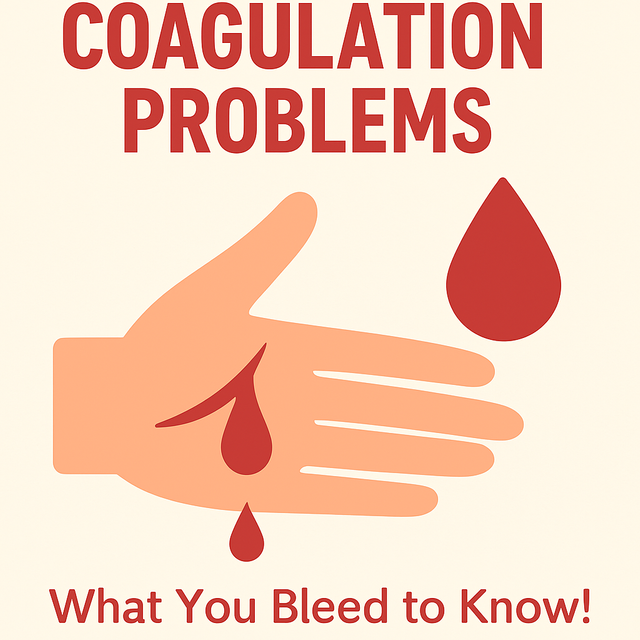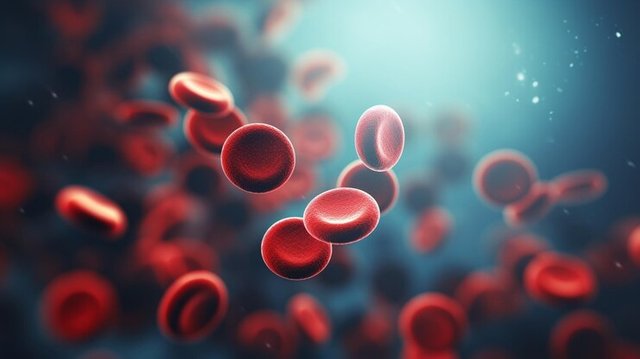Coagulation Problems
Coagulation Problems – What You Bleed to Know!
My Entry for the Healthy Steem Contest
🩸 Bleeding... But When Is It Too Much?
So here is the thing. A little blood? Totally normal. We get cuts and scrapes and also tooth extractions — and we heal up there is no big deal.
But what if someone keeps bleeding for too long? Or bleeds too much from a tiny wound? That happens when we hit the big red flag — coagulation problems!
Yep, I am diving into the slightly spooky but super important world of blood clotting today. So buckle up my healthy fam — let’s talk about why some people just won’t stop bleeding.
🩸 What Exactly Are Coagulation Problems?
In simple terms — our body has a natural system to stop that is bleeding called coagulation. When we bleed our blood is supposed to clot (form a seal) so we do not lose too much of it.
But when someone has a coagulation disorder, their blood either:
- Clots too slowly
- Or does not clot at all!
These people can bleed a lot even from minor injuries or during surgeries like dental scaling or extractions. Scary, right?
🩸 Types of Coagulation Problems
There are different types and here is a quick list:
Hemophilia it genetic disorder where your blood lacks clotting factors mostly affect males.
Von Willebrand Disease – Another inherited condition but this is little milder than the hemophilia. Common in both men and women.
- Vitamin K Deficiency – This vitamin is essential for clotting. Without this vitamin bleeding goes wild.
- Liver Disease – Since clotting factors are made in the liver so any damage there can cause issues
- Medications – Blood thinners like warfarin aspirin and even some antibiotics can make you bleed longer.
Each condition has different severity and symptoms and treatment — but all share one thing: they mess with your body ability to stop bleeding!
🩸 What To Do In Case of Excess Bleeding?
If someone is bleeding too much here is what you should do — especially if you suspect a clotting problem:
- Apply firm pressure with a clean cloth
- Keep the injured area elevated
- Don’t panic — but get medical help ASAP!
- Inform the doctor if the patient takes blood-thinning meds
- If possible, give details about their medical history (e.g. hemophilia or liver disease)
Never ignore prolonged bleeding — what seems minor could become dangerous quickly.
🩸 How Can Coagulation Issues Be Managed?
Thankfully, modern medicines got our back! Here is how doctors usually manage bleeding disorders:
- Factor replacement therapy (especially in hemophilia)
- Vitamin K supplements
- Antifibrinolytic drugs – these slow down the breakdown of clots
- Changing or stopping blood thinners if they’re causing trouble
- Liver treatments, if that’s the root cause
For those with diagnosed issues, prevention is key — regular checkups, proper medication, and avoiding unnecessary surgeries or trauma.
🩸 A Little Care Goes a Long Way ❤️
Knowing about coagulation disorders is not just for doctors — it is for all of us.
Whether it is about recognizing odd symptoms in yourself or helping someone in need and knowledge saves lives.
Sometimes it is not just a nosebleed… sometimes it is a signal.
So lets stay aware stay safe, and take our health seriously — because what’s in our blood really matters.
🩸 Shoutout Time!
Thanks to @helengutier2 and the awesome Healthy Steem team for bringing such a unique topic into the spotlight!
I invite my friends @esvisionaria, @eglis, and @miyexi to join this contest and share their thoughts too!



